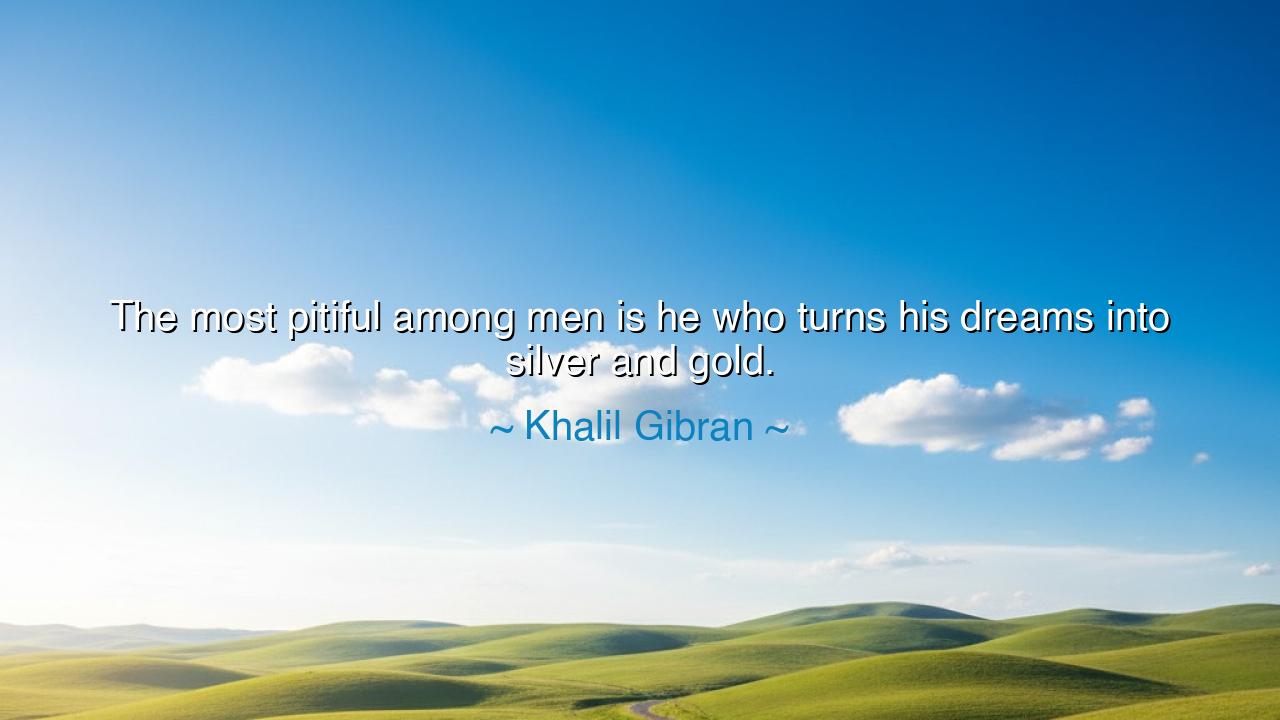
The most pitiful among men is he who turns his dreams into silver






“The most pitiful among men is he who turns his dreams into silver and gold.” Thus wrote Khalil Gibran, the poet of Lebanon and prophet of the human soul — a voice whose words echo like sacred bells through the corridors of time. In this single line, he lays bare one of the deepest wounds of mankind: the corruption of the spirit of dreaming by the hunger for wealth and possession. For Gibran, a dream is not a thing to be sold, but a seed of heaven — a sacred whisper from the divine that calls man toward beauty, truth, and love. To turn such a gift into silver and gold is to strip it of its wings, to trade eternity for dust.
In Gibran’s age, the world trembled between two great powers — the yearning heart of the poet and the iron heart of modern commerce. He saw men who once dreamed of art, music, invention, and faith become slaves to the coin. Their dreams, once radiant with fire, became cold tools for gain. He wrote not to condemn wealth itself, but to awaken the truth that when a dream is made to serve greed, its light fades, and the dreamer becomes a beggar before his own soul. The pitiful man is not the poor, but the one who sells his vision — who measures the worth of beauty in gold, who builds palaces yet loses his heaven within.
Look to the story of Vincent van Gogh, the painter whose hands trembled with the light of unseen worlds. He lived and died poor, his art unsold, his name unknown in his time. Yet his dreams were not for sale. He painted not for coin but for the ecstasy of truth, for the sacred dialogue between color and soul. In every stroke of his brush, he offered his spirit to the eternal. He could have sought wealth or approval, but he chose authenticity over comfort. And though he died in loneliness, his vision has since filled the world with glory. He was rich beyond kings — while countless men of fortune have been buried in obscurity, their gold mute, their names forgotten.
Gibran’s words cut like a prophet’s sword, warning us that when a man begins to price his dream, he begins to lose his soul. The merchant of dreams is poorer than the beggar in the street, for he has sold the very essence that made him divine. What is art without love? What is invention without wonder? What is success when the heart no longer sings? The pitiful man is he who looks at his own vision and asks not, “Is it true?” but “What will it earn?” Such a man has traded the sacred flame for a handful of glittering ash.
Yet the lesson is not to reject the world, but to redeem it through purpose. Wealth, when born of integrity, can be a vessel for good; but when it enslaves the dreamer, it becomes his prison. Gibran urges us to remember that the dream is holy — a breath of God entrusted to our mortal hands. To honor it, we must labor not for the applause of men, but for the joy of creation itself. The poet must write as if his soul were on fire. The teacher must teach as if planting stars in the minds of children. The builder must build not for vanity, but for the shelter of generations yet unborn.
To the seekers of this age, who dwell in a world drunk on commerce and speed — hear this: Guard your dreams. Let not their worth be weighed by the coin of others. If your vision brings peace, truth, or beauty, then you have already succeeded beyond all measure. Do not chase the mirage of wealth, for gold cannot feed the soul, and silver cannot buy meaning. Let your hands work with love, your art bloom with sincerity, and your heart remain untamed by the market of men.
So let these words of Gibran be your lamp: “The most pitiful among men is he who turns his dreams into silver and gold.” Do not be that man. Let your dreams remain pure, alive, and luminous. Nurture them as one tends a sacred flame — not for profit, but for the joy of light itself. For in the end, when the treasures of this world are dust, it is the unbought dream that endures. And the soul that lived by its dream shall rise radiant, crowned not in silver nor gold, but in the everlasting glory of truth.






AAdministratorAdministrator
Welcome, honored guests. Please leave a comment, we will respond soon